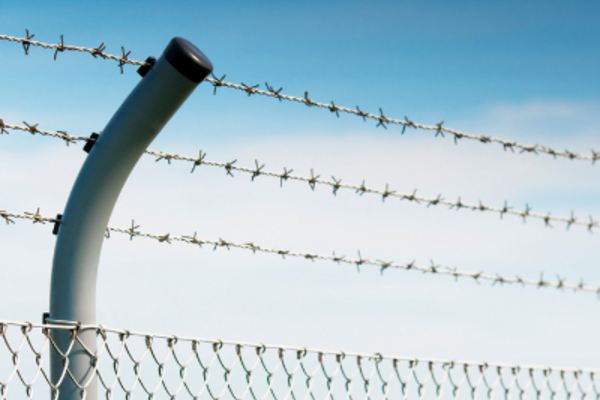HMIP’s report demonstrates appalling failings in access to justice, treatment of vulnerable adults, and Home Office decision-making, in a centre where many people facing removal to Rwanda are now held.
On Friday 1st July Her Majesty’s Inspector of Prisons (HMIP) delivered a comprehensive report on Colnbrook Immigration Removal Centre. It raised a number of alarm bells about access to justice, Home Office decision-making and case progression, and the operation of safeguards. Given that many people subject to the government’s Rwanda policy have been placed in Colnbrook IRC the publication of this report is timely. It raises concerns that those individuals are being denied access to justice and adequate safeguards to prevent wrongful detention.
Access to Justice
HMIP identified a lack of access to justice in Colnbrook IRC. 69% of the people who answered HMIP’s survey said that they had not received legal advice in the centre and 48% of people said that they did not have a lawyer. HMIP identified a particular problem around access to justice in the most urgent circumstances – namely when an individual is facing enforced removal: “Some detainees who were due to be removed on charter flights were located on Echo Unit as part of the centre’s approach to preventing the spread of COVID-19. This resulted in limited access to the internet to communicate with their legal representatives at a critical time.” There is a real risk that people are facing removal from the UK without legal advice.
HMIP further stated that “in our survey, only 54% of detainees said that they had been given information in a language they could understand about how to see immigration staff and get legal advice in their first two days at the centre, and some told us they were unsure about how to contact a legal representative.”
Another key concern identified by HMIP was the absence of Home Office staff. Only 30% of people said that the Home Office had kept them informed about the progress of their case. The Home Office’s ‘Detention Engagement Teams’ – introduced to improve the department’s engagement with detained people – were functioning poorly, and “low staffing levels and a lack of ambition from leaders meant that there was almost no face-to-face interaction, while the team’s telephones often rung unanswered”... “many detainees told us they found it difficult to obtain an update on their case”.
“The centre had been let down by Home Office services that failed to communicate adequately with detainees or act with enough urgency, meaning that some cases dragged on unnecessarily to the detriment of detainees.”
The report notes that people in Colnbrook have access to just a single fax machine, yet over the past month many of BID’s faxes to Colnbrook have failed to be delivered.
Safeguards for vulnerable adults:
The Home Office has safeguards in place designed to prevent the wrongful detention of vulnerable adults. Those safeguards have a number of failings which have been well documented, including most recently by the charity Medical Justice in their recent report “Harmed not Heard”. Here HMIP identified that key safeguards such as the rule 35 process were not functioning properly. Under the rule 35 process, the doctor can notify the Home Office of an individual’s vulnerability, history of torture or risk of suicide, so that the appropriateness of detention can be reviewed in the light of that evidence.
HMIP found that “Rule 35 reports lacked detail and did not always provide an adequate assessment of the impact of continued detention on a detainee’s physical and mental health.”
“As at our previous inspection, most reports were not detailed enough; all provided a judgement on the consistency of injuries with the alleged method of torture, but the reasoning was brief and unclear. Only one report clearly explored the likely impact of further detention. Although nine of the reports contained claims of psychological trauma, such as low mood, insomnia, depression, anxiety and flashbacks, evaluation of the trauma was vague and limited, and none assessed whether a detainee was suffering from post-traumatic stress disorder”
The rule 35 reports were overwhelmingly about torture - “Of the 105 Rule 35 reports submitted in the previous six months, only four related to health concerns or suicide risk; the remaining 101 all concerned claims of torture”... ““There were insufficient safeguards against the detention of detainees with suicidal thoughts... Rule 35 reports were seldom prepared when necessary”
We were saddened to learn that 78% of the people surveyed by HMIP reported that they had felt depressed while at the centre and a quarter said that they had felt suicidal at the centre. Yet these statistics are likely to have risen since the inspection and the subsequent placement of many people subject to the Rwanda plan in Colnbrook IRC.
Many of those people are particularly vulnerable, having experienced torture or trafficking or other traumatic events in their home country or on the journey to the UK. This is compounded by a lack of familiarity with the asylum system; lack of English language skills; and the sheer desperation that has led people to go on hunger strikes or even attempt suicide.
In this context it is particularly concerning that HMIP found that “no psychologist had been available since August 2021 for those requiring trauma-informed psychological interventions. Detainees with identified treatment needs for trauma were given an in-cell work pack to help them manage their symptoms”. This ‘trauma pack’ has been heavily criticised for advising people at risk of suicide to: do a crossword or sudoku; play an instrument or learn how to play one; punch a punching bag; do some colouring or paint; try aromatherapy.
Prolonged detention and Home Office decision-making
In many cases inspectors did not appear to be satisfied that detention was necessary: “Given how many detainees were quickly released into the community, there is a question about why they had been placed in the centre in the first place. Furthermore, some distressed detainees who should have been released earlier as a result of physical and mental health problems were not served well by inadequate assessments in Rule 35 reports.”... “In the previous six months, 52% of detainees leaving the centre had been released into the community, suggesting that many should not have been detained in the first place.”
HMIP reported that “Some people had been held for lengthy periods despite barriers to removal and repeated recommendations for release from the Home Office’s case progression panel”. One man they encountered had been detained for over 1,000 days.
Meanwhile HMIP once again reported that people continue to have their detention unnecessarily because “A shortage of suitable accommodation meant that others continued to be detained even after being granted conditional bail” – a problem that BID has been raising with the Home Office for years without any progress towards a solution. Meanwhile “Some detainees were released homeless, but there were no reliable data on this.”
HMIP also criticised the unnecessary extending of detention when an individual is granted bail but electronic monitoring is imposed. “We were told that detainees granted bail were routinely tagged for electronic monitoring, but there were no reliable records of how many had been subject to monitoring. Contractors had 72 hours to apply tags before detainees were released, which was an excessive period of time to continue detention after the granting of bail. The Home Office was unable to tell us how long in practice it took contractors to fit electronic tags.” We agree with HMIP’s view that this time period is excessive and demonstrates an attitude towards deprivation of liberty that is far too casual.
Conclusion
The failings highlighted in this inspection report are a damning indictment of the Home Office’s approach to detention and illustrate a system that is not fit for purpose. Immigration detention is harmful, unnecessary and expensive, and an affront to fundamental rights and access to justice. Reports like this one by HMIP demonstrate that no matter the quality of the conditions of detention and how many improvements are made, this system is fatally flawed and urgently needs to be ended.









